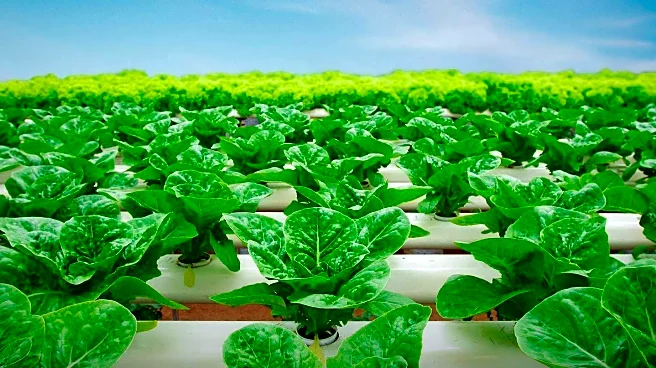What's Happening?
Urban agriculture is gaining attention as a viable solution to food security challenges exacerbated by climate change. Historically, urban farming played a significant role during World War I and II in the United States, providing a substantial portion of the country's vegetable supply. Today, the practice has evolved with technological advancements, including vertical farming and the use of artificial intelligence (AI) to enhance productivity. Countries like China are leading the way, with urban agriculture contributing significantly to their food supply. The practice is seen as a sustainable alternative to traditional farming, which is increasingly vulnerable to climate fluctuations.
Why It's Important?
The rise of urban agriculture is crucial in addressing the growing global food demands and mitigating the impacts of climate change on traditional farming. By utilizing AI and smart technology, urban agriculture offers a more resilient and efficient food production system. This shift is particularly important for countries facing severe climate impacts, such as Pakistan, India, and Bangladesh, where traditional agriculture has suffered due to unseasonal weather patterns. Urban agriculture not only promises food security but also promotes organic farming, which benefits human health and the environment. As populations grow and food demands increase, urban agriculture is becoming an essential component of sustainable development strategies.
What's Next?
Countries affected by climate change are encouraged to adopt urban agriculture practices, learning from China's experience. Policymakers, particularly in South Asia, are urged to revise agricultural policies to support urban farming initiatives. This includes creating favorable conditions for urban agriculture and prioritizing it in national planning. By doing so, these countries can enhance their food security and resilience against future climate-related challenges. The continued development and implementation of urban agriculture systems are expected to play a significant role in global food production strategies.
Beyond the Headlines
Urban agriculture represents a shift towards more sustainable and eco-friendly food systems. It aligns with global efforts to reduce the environmental impact of food production and offers a pathway to organic farming. This transition not only addresses food security but also contributes to reducing physical and mental stress associated with food scarcity. As urban agriculture becomes more prevalent, it may also influence cultural and societal norms around food production and consumption, promoting a closer connection between urban populations and their food sources.








